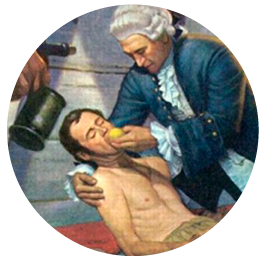It is a commonly accepted myth that people are used as guinea pigs in medical experiments. In reality, this myth is false and no information has been found to validate this assumption.
At BRCR Global, we are committed to ethics in medical research and do not conduct human studies without informed consent and rigorous ethics committee approval. Our goal is to collaborate with medical research in a manner that is empathetic, ethical and respectful of the people who participate.
 Respect, ethics and empathy.
Respect, ethics and empathy.
Today, clinical trials are strictly regulated and have to be approved before they can be conducted. To participate in a medical study, a person must provide written informed consent after being fully informed about the details of the study, including its purpose, procedures, risks and benefits. In addition, participants must meet certain inclusion and exclusion criteria, which vary from study to study.
In recent years, medical research has made great advances in medication and treatments for the prevention, detection and cure of diseases in different fields of medicine.
Some examples of the importance of clinical trials:
In the area of cardiology, the EMPA-REG OUTCOME study demonstrated that the drug empagliflozin significantly reduced heart attacks, strokes and cardiovascular deaths in patients with type 2 diabetes.
The SPRINT study demonstrated that intensive blood pressure treatment in elderly patients with hypertension reduced the incidence of cardiovascular events and mortality compared to conventional treatment.
In oncology, the KEYNOTE-006 study showed that the drug pembrolizumab significantly improved overall survival in patients with advanced melanoma.
The ACOSOG-Z0011 study, on the surgical treatment of breast cancer, showed that removal of all axillary lymph nodes was not necessary in selected patients with early breast cancer, which reduced surgery-related morbidity without affecting patient survival.
 All clinical studies are strictly regulated.
All clinical studies are strictly regulated.
In mental health, the STAR*D study compared various treatments for depression, which helped inform best treatment practices for this disease that affects millions of people.
The CATT study, on the treatment of age-related macular degeneration, compared two different medications and two forms of treatment delivery and found that the two options were equally effective, helping physicians make informed treatment decisions.
These are just a few examples of successful clinical trials that have led to significant advances in medical care and improved quality of life for individuals.
Each clinical trial is unique and has different goals and outcomes. Ongoing medical research is vital to continue advancing the prevention, diagnosis and treatment of disease.

DW Magazine interviewed our CEO, Aldo Zambrano, in its August edition about Puerto Rico.
We are proud to be recognized as a protagonist for our work in clinical research. We are very happy to work in Puerto Rico and every day we strive for excellence.

DW Magazine interviewed our CEO, Aldo Zambrano, in its August edition about Puerto Rico.
We are proud to be recognized as a protagonist for our work in clinical research. We are very happy to work in Puerto Rico and every day we strive for excellence.

According to the WHO, childhood vaccines save the lives of four million children a year by providing protection against diseases such as diphtheria, measles, pneumonia, rotavirus, rubella, tetanus and polio.

According to the WHO, childhood vaccines save the lives of four million children a year by providing protection against diseases such as diphtheria, measles, pneumonia, rotavirus, rubella, tetanus and polio.

Clinical trials are what guarantee pharmacological safety and the improvement in the method allows drugs and therapies to be developed today with the highest ethical, scientific and quality guarantees.

Clinical trials are what guarantee pharmacological safety and the improvement in the method allows drugs and therapies to be developed today with the highest ethical, scientific and quality guarantees.

Days like today are what we work hard for, where a small victory means a big step for the community, especially for those suffering from diseases and for their families and friends who accompany them.

Days like today are what we work hard for, where a small victory means a big step for the community, especially for those suffering from diseases and for their families and friends who accompany them.

It is a commonly accepted myth that people are used as guinea pigs in medical experiments. In reality, this myth is false and no information has been found to validate this assumption.

It is a commonly accepted myth that people are used as guinea pigs in medical experiments. In reality, this myth is false and no information has been found to validate this assumption.

Clinical trials play a crucial role in the fight against cancer. These studies are fundamental to evaluate the effectiveness and safety of new treatments and therapies, as well as to improve cancer care in general.

Clinical trials play a crucial role in the fight against cancer. These studies are fundamental to evaluate the effectiveness and safety of new treatments and therapies, as well as to improve cancer care in general.

Based on the premise that medical research is the only tool that Science has to study new and better treatments for diseases, from BRCR – as a key link – we are committed to the task of providing the quantity and quality of information necessary for the peace of mind and safety of all the actors involved in the processes.

Based on the premise that medical research is the only tool that Science has to study new and better treatments for diseases, from BRCR – as a key link – we are committed to the task of providing the quantity and quality of information necessary for the peace of mind and safety of all the actors involved in the processes.
55 Weston Rd
Weston, FL 33326
Phone: +1 888 745 2727
8200 W Sunrise Blvd Suite D2
Plantation Fl 33332
Phone: +1 888 745 2727
Ashford Medical Center 29 Washington Street Suite 310 -San Juan, PR 00907
Phone: (787) 313 3307
Edif. XIMA, Via Samborondon Piso 1 Oficina 120
Phone +593 4 209 7403
Sur 132 No. 108 Suite 601-605 Col. Las Américas CP 01120
Phone: +52 5568632661
Ofident del CCCN, 200 m Norte y 25 m Este.
Barrio Dent, San Jose. Costa Rica
Phone: + 506 4800 0254 / +506 8867 2186